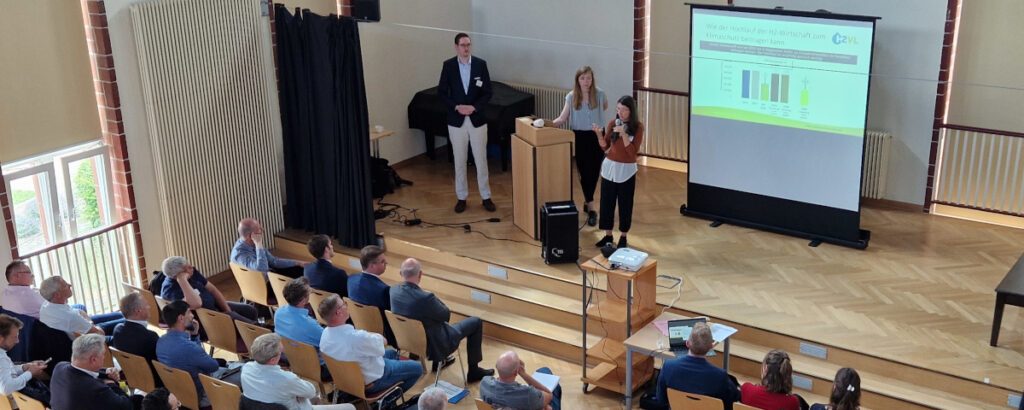Study shows: Hydrogen economy has great potential in Havelland – Results of the H2VL initiative presented at final workshop
July 4, 2023 | Green hydrogen is an important building block for the energy transition: It makes it possible to store renewable energy and can be used in various sectors. In the H2VL project for the Havelland district, experts from science and consulting companies have investigated how the entire hydrogen value chain, consisting of production, storage, distribution and use, can be brought together. In a final workshop last Wednesday, they presented their results of the hydrogen feasibility study in Nauen.
The project team was able to identify and network various local actors along the value chain and support them in the realization of projects. From production to distribution and use, all parts of the value chain were covered. One of the core results: Havelland has very good prerequisites for implementing diverse H2 projects. An important location advantage is that there is great potential in Havelland for the expansion of renewable energies and thus for the production of renewable – also called green – hydrogen. It is important for the implementation of these projects that the citizens of Havelland benefit from this potential.
About 40 participants on site in Nauen as well as online showed great interest in the presentation of the study. Representatives of the project consortium presented the most important results. The project was carried out by the Reiner Lemoine Institute (RLI), Ingenieurgesellschaft Auto und Verkehr (IAV), Consulting for Drive (C4D) and the Institute for Climate Protection, Energy and Mobility (IKEM).
Collaboration with H2 stakeholders on the ground was an important task of the H2VL initiative. For this purpose, the project team carried out various formats: Bilateral discussions and on-site meetings focused on getting to know each other at the beginning. In addition, all stakeholders were systematically asked for data on planned H2 projects in a survey. In a total of nine workshops, the participants were able to network with each other and learn about projects within and outside Havelland. The networking among the actors and the degree of cooperation could thus be increased.
Two hydrogen clusters have been developed in the project to both boost the ramp-up of the H2 economy and benefit the region. In the Eastern Havelland cluster, the energy supply company GASAG and its subsidiary Energie Mark Brandenburg (EMB) are planning to operate an electrolyzer – a device in which water is split into hydrogen and oxygen with the help of electric current – at the Energiewendelabor site in Ketzin/Havel. The green hydrogen produced there can be used in municipal vehicle fleets in Nauen that are not suitable for battery-electric operation. In addition, waste heat from the electrolyzer can be incorporated into the gas transfer station in Ketzin/Havel, displacing boiler heat. The cluster has been assessed for both its economic viability and site-related factors and has a good chance of being realized.
“We have been planning an electrolysis plant at the Energiewendelabor site in Ketzin for some time. With the procurement of hydrogen-powered vehicles for the municipal fleets in Nauen, a sustainable purchase source for this regionally produced green hydrogen is created. This will enable the project to be implemented in a timely manner,” said Reinier Waters, head of GASAG’s hydrogen activities.
In the West Havelland cluster, the focus was on generating district heating in a more climate-friendly way. By using wind power directly, district heating in Rathenow could be decarbonized, i.e. a reduction in carbon and CO2 emissions could take place. Surplus electricity from the wind turbines can be used to generate hydrogen and be made available for municipal mobility. Two driving stakeholders in this project are Rathenow Heat Supply and Rathenow Water and Wastewater Association. “By using wind power from a municipal wind farm in the direct vicinity, there is an opportunity to decisively advance the traffic turnaround and heat turnaround through hydrogen production and power to heat at economic prices in Rathenow,” says Günter Rall, managing director of Rathenower Wärmeversorgung.
The completion of the H2VL project is not the end in Havelland, but rather the start for the development of a hydrogen economy. In order for the district to achieve its climate goals, it is important to reduce greenhouse gas emissions – especially in the transport and heating sectors. For this reason, Havelland is also planning to review the potential uses of hydrogen. In addition, a close cooperation with the actors of the clusters is aimed at in order to supervise and support their projects also in the long term.
District Administrator Roger Lewandowski has high expectations for the future developments of hydrogen projects in Havelland: “The use of hydrogen and the inclusion of this alternative energy carrier in a regional value chain offers us the opportunity to strengthen local economic sectors and to use and meet the demand for energy in a sustainable way, especially for the local heating and mobility sector. With our participation as a HyExpert model region and the networking of all partners, we have set the course for not only thinking about the establishment of an entire value chain – from the production and storage to the use of hydrogen, but also taking the first steps towards the realization of some projects. We want to continue working on this with all study participants and also other interested parties.”
Havelland had been selected as one of 15 HyExpert regions under the National Hydrogen and Fuel Cell Technology Innovation Program (NIP2) and received funding of nearly 400,000 euros from the German Federal Ministry of Digital Affairs and Transport. The funding directive is coordinated by NOW GmbH and implemented by Project Management Jülich (PtJ). For more information on the project and how it is progressing, contact klimaschutz@havelland.de and visit the website www.h2vl.de.
